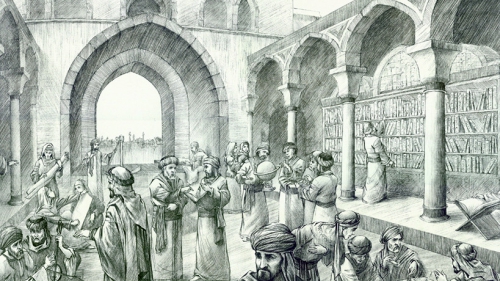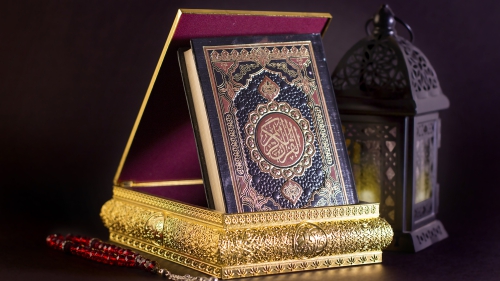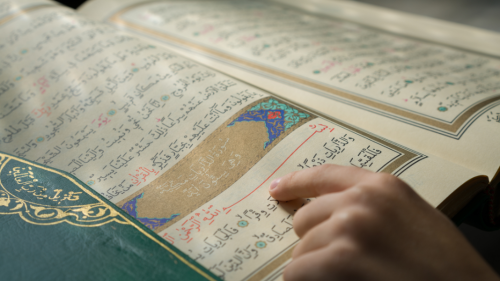A Muslim Prom - For Girls Only
 |
FREMONT, California - The trappings of a typical high school prom were all there: the strobe lights, the garlands, the crepe pineapple centerpieces and even a tiara for the queen. In fact, Fatima Haque's prom tonight had practically everything one might expect on one of a teenage girl's most important nights. Except boys.
Ms. Haque and her friends may have helped initiate a new American ritual: the all-girl Muslim prom. It is a spirited response to religious and cultural beliefs that forbid dating, dancing with or touching boys or appearing without a hijab, the Islamic head scarf. While Ms. Haque and her Muslim friends do most things other teenagers do - shopping for shoes at Macy's, watching "The Matrix Reloaded" at the mall or ordering Jumbo Jack burgers and curly fries at Jack in the Box - an essential ingredient of the American prom, boys, is off limits.
So they decided to do something about it.
"A lot of Muslim girls don't go to prom," said Ms. Haque, 18, who removed her hijab and shawl at the prom to reveal an ethereal silvery gown. "So while the other girls are getting ready for their prom, the Muslim girls are getting ready for our prom, so we won't feel left out."
The rented room at a community center here was filled with the sounds of the rapper 50 Cent, Arabic pop music, Britney Spears and about two dozen girls, including some non-Muslim friends. But when the sun went down, the music stopped temporarily, the silken gowns disappeared beneath full-length robes, and the Muslims in the room faced toward Mecca to pray. Then it was time for spaghetti and lasagna.
It is perhaps a new version of having it all: embracing the American prom culture of high heels, mascara and adrenaline while being true to a Muslim identity.
"These young women are being very creative, finding a way to continue being Muslim in the American context," said Jane I. Smith, a professor of Islamic studies at the Hartford Seminary in Connecticut. "Before, young Muslims may have stuck with the traditions of their parents or rejected them totally to become completely Americanized. Now, they're blending them."
Non-Muslim students at San Jose High Academy, where Ms. Haque is president of the student body, went to the school's coed prom last month - renting cars or limousines, dining at the Sheraton, going to breakfast at Denny's and, for some, drinking. Ms. Haque, meanwhile, was on her turquoise cellphone with the smiley faces organizing the prom. She posted an announcement on Bay Area Muslim Youth, a Yahoo news group scanned by young people throughout the San Francisco Bay area, home to one of the country's largest and most active Muslim communities.
"We got so close, we wanted to hang," said Fatin Alhadi, 17, a friend, explaining the farewell-to-high-school celebration, which involved cooking, shopping and decorating the room, rented with a loan from Ms. Haque's parents. "It's an excuse to dress and put makeup on. Everyone has so much fun at the prom."
The sense of anticipation was palpable at Ms. Haque's house this afternoon, including an occasional "Relax, mom!" For Ms. Haque and her friends, the Muslim prom - like any prom - meant getting your eyebrows shaped at the last minute and ransacking mother's jewelry box. It was a time to forget about the clock, to look in the mirror and see a glamorous woman instead of a teenager. To be radiant.
Ms. Haque and her Muslim girlfriends dwell in a world of exquisite subtlety in which modesty is the underlying principle. Though she wears a hijab, Ms. Alhadi recently dyed her black hair auburn. "Everyone asks me why, because nobody sees it," she said. "But I like to look at myself."
Ms. Haque, who will attend the University of California at Berkeley in the fall, is one of a growing number of young Muslim women who have adopted the covering their mothers rejected. Islamic dress, worn after puberty, often accompanies a commitment not to date or to engage in activities where genders intermingle.
Her parents immigrated from Pakistan, and her mother, Shazia, who has a master's degree in economics, does not wear the hijab.
Ms. Haque's decision to cover herself, which she made in her freshman year, was nuanced and thoughtful.
"I noticed a big difference in the way guys talked," she said. "They were afraid. I guess they had more respect. You walked down the street and you didn't feel guys staring at you. You felt a lot more confident." Her parents were surprised but said it was her decision.
Ms. Haque faced some taunting after the terror attacks on Sept. 11, 2001. "They call you terrorist, or raghead because high school students are immature," she said.
But she and her friends say Muslim boys, who are not distinguished by their dress, may have a tougher time in American society.
"The scarf draws the line," said Ms. Alhadi, the daughter of a Singaporean mother and Indonesian father. "It's already a shield. Without it everything comes to you and you have to fight it yourself."
Ms. Haque is enrolled in the academically elite International Baccalaureate program at San Jose High Academy, a public school where, as her friend Morgan Parker, 17, put it, "the jocks are the nerds."
But the social pressures on Muslims, especially in less-cloistered settings, can be intense.
"I felt left out, big time," said Saira Lara, 17, a senior at Gunn High School in Palo Alto, of her school's prom. But she gets a vicarious taste of dating by talking with her non-Muslim friends.
"The drama that goes on!" Ms. Lara said, looking dazzling at the Muslim prom in a flowing maroon gown. "The Valentine's Day without a phone call or a box of chocolates!"
Imran Khan, 17, a senior at Los Altos High School, admitted that his school's prom was not easy.
"When I told my friends I wasn't going, they all said, `Are you crazy?' " he said in a telephone interview. "Prom is a you-have-to-go kind of thing. Obviously if all your friends are going and you're not, you're going to feel something. That day I was, `Oh man, my friends are having fun and I'm not.' But I don't regret not going."
Most of Mr. Khan's school friends are not Muslim, and his Muslim friends are scattered across the Bay area.
"A lot of times it's difficult," he said. "We guys blend in so you can't tell we're Muslim. We're not supposed to touch the opposite gender. My friends who are girls understand, but when other girls want to hug you or shake your hand, it's hard. I don't want them to think I'm a jerk or something."
Adeel Iqbal, 18, a senior at Bellarmine College Preparatory, a boys' Catholic school in San Jose, went stag to his coed senior prom. Mr. Iqbal decided to go in his official capacity as student body president as well as a representative of his Muslim beliefs.
"Every day we're bombarded with images of sex and partying and getting drunk, in music and on TV, so of course there's a curiosity," he said. "When you see your own peers engaging in these activities, it's kind of weird. It takes a lot of strength to not participate. But that's how I've been raised. When your peers see you're different in a positive way, they respect it."
Nearly all parents of adolescents worry about the pressures of sex, drugs and alcohol, but the anxiety is especially acute in Muslim families who strictly adhere to traditional Islamic dress and gender separation. Many Muslim parents disapprove of what they see as an excessively secularized and liberalized American culture, and are deeply concerned that young Muslims, especially girls, not be put in compromising situations.
Ms. Haque's father, Faisal, a design engineer at Cisco Systems, said that the pressure to conform was "very significant." It is the subject of frequent family discussions.
"It's difficult at best," Mr. Haque said. "It takes a lot of self-control. I have a lot of respect for these kids."
The Haques supported their daughter's decision to organize the Muslim prom. "You have to live in this country," Mr. Haque said. "In order to function, the children have to adapt. Prom is a rite of passage. You don't want them to feel like they don't belong."
Ms. Haque would like the Muslim prom to become an annual event. "My goal is an elegant ballroom with a three-course dinner - no paper plates - women waiters and a hundred girls," she said.
Tonight, the prom room was filled with promise as the young women whirled around the dance floor, strobe lights blinking. "Show off whatever you've got!" Ms. Lara exhorted the throng, sounding like a D.J. "Come on, guys. This is the most magical night of your life!"
Source: http://www.nytimes.com

















